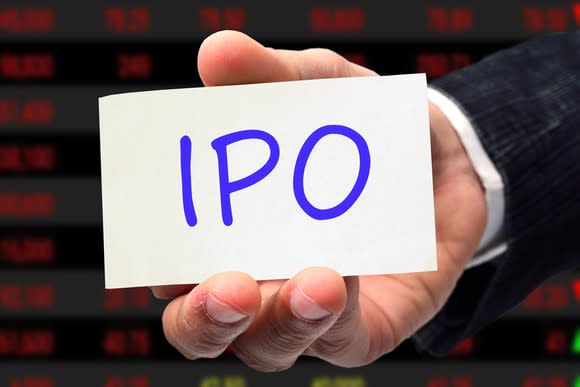Meituan Seeks $60 Billion Valuation With Upcoming IPO: What Investors Need to Know
Trade-war fears aside, the Chinese middle class is set to double by 2022 to 600 million people -- almost twice the population of the entire United States. In addition, China is a mobile-internet-first country, with cellular data usage exploding 162% last year.
For those who are seriously looking at investing in Chinese internet companies, another huge one is set to go public later this year: Meituan. According to Bloomberg, Meituan is looking to raise about $6 billion at a whopping $60 billion valuation. What could cause investors to swoon over Meituan, a company that was founded in 2010? And how did it get so big while remaining relatively unknown outside of China? Here are some answers.

Image source: Getty Images.
What is Meituan?
Meituan does not have an exact, U.S.-based peer for comparison but is rather an amalgam of several businesses. This is a trend among Chinese internet companies, many of which are combinations of services, tailored to the needs of Chinese consumers. To me, Meituan seems like a combination of Groupon, Bookings Holdings, Grubhub, Yelp, and Lyft. In fact, Booking Holdings is already an investor in Meituan.
In 2010, Meituan resembled a Groupon/Grubhub combo, offering a central hub for deals on restaurants and food delivery (coincidentally, Groupon and Grubhub just announced a partnership earlier this year). Over the years, the company expanded its services organically and through a transformative merger with rival Dianping in 2015, creating a dominant industry player in online-to-offline services.
The company now has its fingers in everything from spa and beauty appointments to travel and hotel reservations (much like Booking Holdings). The company has also been involved in ridehailing as of early 2017, launching its own service to take on the industry leader, Didi Chuxing. And it then bought Mobike, a bike-sharing start-up, for $2.7 billion in April.
The company got a fresh $4 billion investment from Tencent (NASDAQOTH: TCEHY) last year, valuing the company at $30 billion. So Meituan is looking like another very strong investment for Tencent, as the company could go public for as much as twice that figure.
Meituan's impressive numbers
Meituan has achieved impressive scale and network effects, which are incredibly important in all internet companies. In 2017, the company:
Generated over five billion transactions, totaling roughly 357 billion yuan ($53.3 billion) in gross merchandise volume.
Grew revenue 161% in 2017 to 33.9 billion yuan ($5.1 billion) -- and that's up from just 4 billion yuan ($0.6 billion) in 2015, a 700% growth rate over a few short years.
Had roughly 310 million active customers and 4.4 million merchants on its platform.
Claimed a 59% share of the food delivery market in China.
As with many high-growth internet platforms, the company is still unprofitable, though those metrics are improving. While actual net losses were 19 billion yuan ($2.8 billion) last year, Meituan's adjusted net loss was only 2.85 billion yuan ($0.4 billion). That's roughly half the net loss from 2016, so things are improving on that front.
A $60 billion valuation would be equivalent to almost 12x sales (from 2017), which is high but not overly expensive for a high-growth internet company.
A beneficial big brother
As it does with JD.com (NASDAQ: JD), Tencent now owns roughly 20% of Meituan, followed by venture capital firm Sequoia Capital and Meituan's founder and CEO Wang Xing, each with an 11.4% stake. Xing and other co-founders will retain majority voting rights, however, due to the Meituan's dual-share structure.
Still, having the backing of Tencent, owner of the social messaging super-app WeChat, is a big vote of confidence that has certainly benefited companies like JD. In fact, Meituan's valuation may even exceed JD's upon going public.
Before its $4 billion investment last October, Tencent had been an investor in Dianping in 2015 before the merger. Interestingly, Meituan had been backed by Tencent rival Alibaba, but the latter has sold off most of its stake and started its own services marketplace called Koubei, which recently raised money from private investors at an estimated $8 billion valuation -- meaning it's still quite small compared to Meituan.
Coming to the Hang Seng
Meituan just applied to the Hang Seng index in Hong Kong, which means if you're interested in buying Meituan later this summer, you'll have to check with your broker to see if you can trade shares on that index. For some foreign stocks, you can buy American depository receipts on American exchanges, but it looks like that won't be the case here (at least not yet). If you do invest in Hong Kong, you'll have to also navigate exchange rates among the yuan, the Hong Kong dollar, and the U.S. dollar.
Like smartphone company Xiaomi, Meituan is likely eager to go public due to a change in Hong Kong's listing rules, which made it easier for companies to list with dual voting shares (allowing owners to maintain control). While governance is a concern, especially for Chinese companies with all-controlling founders, these listings do give investors more ways to play the booming Chinese internet market. And 161% growth is nothing to ignore.
More From The Motley Fool
Billy Duberstein owns shares of Alibaba Group Holding Ltd., Groupon, JD.com, and Tencent Holdings. The Motley Fool owns shares of and recommends Booking Holdings, JD.com, and Tencent Holdings. The Motley Fool recommends Yelp. The Motley Fool has a disclosure policy.
